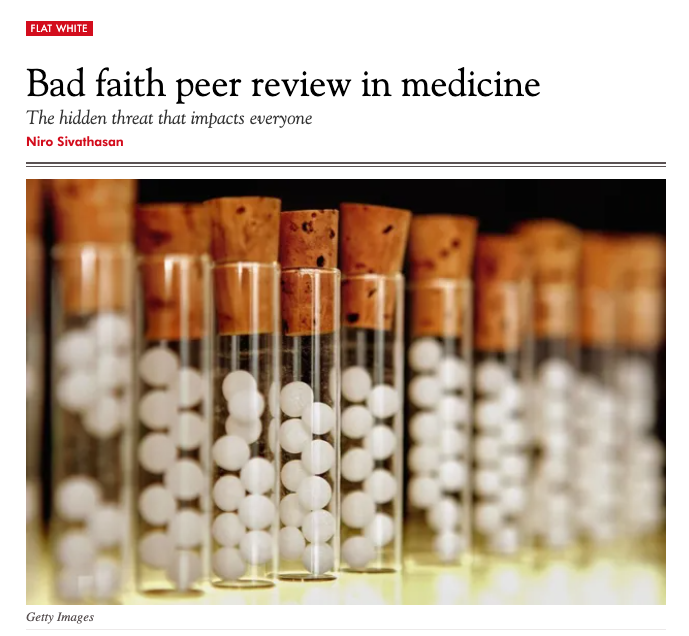
In essence, it is the determination of professional competence by a committee of local peers.
although arguably better referred to as malicious peer review or bad faith peer review (BFPR), due to the more apt legal implications. BFPR constitutes a transgression against patients, HCPs, and the integrity of healthcare itself, and it may be done for personal or political gain.
around:
- Selective case-review(s) by biased committees and reports which do not reflect reality: the cherry-picking of cases that portray a medical doctor in a negative light despite their broader record of competence, along with adversely massaged reports which sometimes contain abject falsehoods.
- Lack of transparency and relevance: including withholding of evidence and internal communications, conflicts-of- interest with reviewers (who have a predisposition to rule against the targeted medical doctor), and the conducting of ‘loaded’ reviews in secrecy.
- Violation of due process: which, quite simply, pertains to the denial of a fair opportunity for a medical doctor to
provide an adequate response themselves, present counter-evidence, or publicly cross-examine witnesses.
In my former role as vice president of a health reform group, and in my current roles as a state secretary for AMPS (Australian Medical Professionals’ Society) and medical counsel to leading law firms; I have seen the most egregious violations of fairness and natural justice applied to HCPs, whether medical practitioners (i.e., doctors) or paramedical practitioners (dentists, nurses, and so on), who are subjected to predetermined outcomes in process-manipulating ‘kangaroo courts’. A friend who is a senior physician was the victim of such in a system which simply did not like his opinionated nature, and he was left with the stark choice of either accepting the gradual erosion of his dignity and well-being, or publicly exposing and confronting the issue for what it truly is. He did the latter, and demonstrated the allegations to be unfounded and exposed the administrative hurdles, but this came at great financial and emotional costs
to him.
litigation per capita, exceeding California and New York, and partly fuelled by skyrocketing numbers of newly minted lawyers who proceed down the ‘no win, no fee’ path with impecunious clients who are also wanting to make a fast buck.
Interestingly, even established large law firms forego their due to the courts and happily partake in such.
- Clear policies, and training: institutions should have well-defined policies outlining the requirement for evidence-
based peer review, along with training to help prevent abuses. - Independent oversight: external and wholly separate oversight bodies may help to ensure fairness and impartiality, particularly in contentious cases.
- Legal Protections: as evidenced by America’s Health Care Quality Improvement Act (HCQIA) of 1986, which was intended to grant immunity for good faith peer reviews; the law has been misused by hospitals to target and silence whistle-blowers and HCPs. Reviewers and so-called investigators who may have questionable motives frequently evade scrutiny in a system designed to safeguard patients and protect colleagues from practitioners who are dangerous or unethical. Therefore, there must be legal protections but also ramifications meted by the judiciary in
cases of BFPR.
- The removal of conscientious HCPs, who usually are safe and competent, from the workforce reduces access and reduces healthy competition and increases prices.
- The accompanying shockwaves discourage dissent amongst HCPs, and it fragments unity amongst HCPs and undermines the trust which is necessary for effective collaboration.
- HCPs who remain may be terrified, and in order to prevent fallout affecting their families, they turn a blind eye to
bad things – precisely as we have witnessed during some of the shenanigans this decade.
We saw BFPR used extensively during the Covid period between 2020 and 2023, and it continues to notably be used for financial reasons in specialities such as cosmetic surgery, where ethically questionable doctors have infiltrated regulatory bodies for political subversion. However, BFPR is not merely an administrative failing, and all HCPs have a duty to raise their awareness on this topic and to stand in solidarity with their persecuted colleagues.
Much of healthcare operates as a precarious construct held together by vested interests which create an environment where meritocracy and objectivity often falter. As noted by Lewandowsky et al. (2012) and affirmed by Ng et al. (2016),
a particular predicament in Australia is the misinformation generated by authorities and their delegates, partly in cahoots with certain media outlets. Ng et al. further noted that ‘multiple current laws are already being breached in Australia by
sham peer reviews, including the federal competition laws and international human rights conventions, in addition to various state criminal codes and crimes acts’.
Despite all this, it is my emphatic view that any reasonable person would not stand by or, worse still, propagate processes that are intentionally opaque to distort accountability, particularly by governmental or government-authorised bodies.
Thus, without collective and urgent action, the very foundations of ‘genuine’ health care, which involves the protection of patients whilst simultaneously affording them choice, shall remain compromised. Australia must, therefore, implement
codified, systemic reforms, starting with a national professionalism code as elementary as it sounds, in order to offset the societal trend towards unethical deterioration. Restoring trust in the peer-review process is a moral imperative necessary for the health and sustainability of the medical profession.


